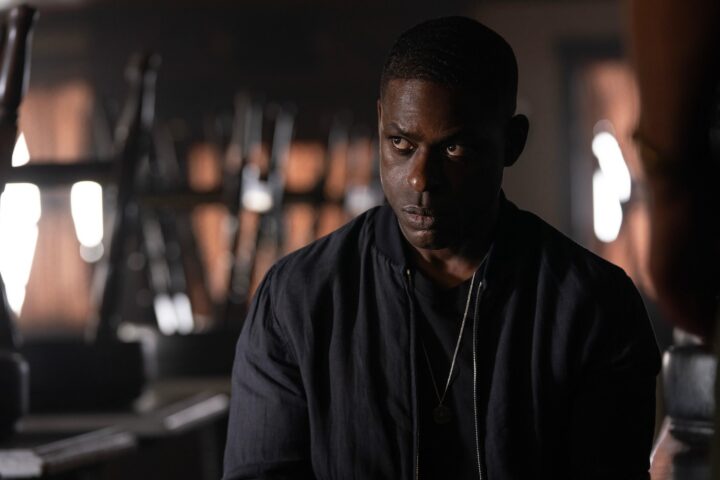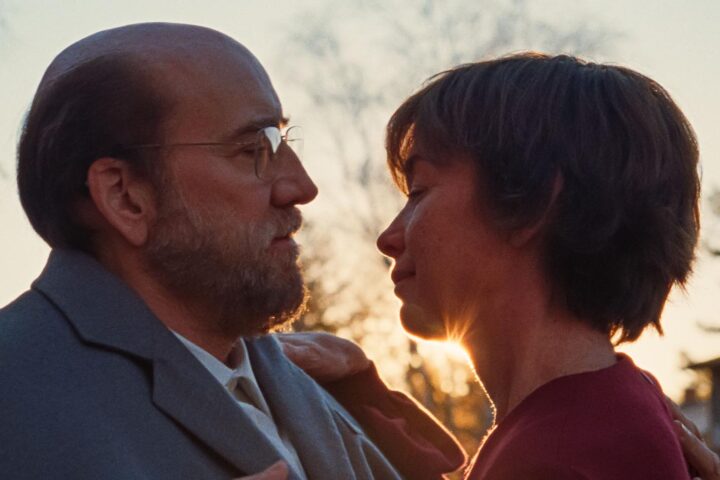Playwright Annie Baker has developed a distinctive style in which silences often speak louder than words, the words themselves mean more than what’s actually said, and routine conversations and events have the power of earth-shattering revelations. It’s an approach to drama that demands us to pay close attention to every line of dialogue and every flicker of emotion on an actor’s face, lest we miss crucial details. In some ways, that’s a deeply cinematic approach to dramaturgy, recalling the economy of Robert Bresson and Harold Pinter’s work, except that Baker’s is far more emotionally immediate.
The plot of Baker’s quiet and often moving feature directorial debut, Janet Planet, details the bond between 11-year-old Lacy (Zoe Ziegler) and her acupuncturist mother, Janet (Julianne Nicholson), in rural Western Massachusetts in the summer of 1991 just before Lacy enters the sixth grade. The closest that the film comes to dramatic conflict lies in its portrait of the revolving door of love interests and friends that make up its three “acts”: the rough and laconic Wayne (Will Patton); Janet’s friend Regina (Sophie Okonedo), who’s part of a cult-like art colony that she contemplates leaving; and Avi (Elias Koteas), the intense leader of that colony.
It’s primarily through Lacy’s shifting perspective that we see her mother and those other characters, with each encounter either bringing her closer to Janet or threatening to tear them apart. As has been typical of Baker as a playwright, though, instead of relying on dramatic confrontations or major plot turns, she homes in on small details to illuminate her characters’ lives: the figurine set with chocolate-wrapper hats that Lacy hides in a bedroom cupboard; Lacy fibbing to Regina about using the latter’s shampoo as an indication of her own suspicious feelings toward her; Janet in Lacy’s presence randomly blurting out how unhappy she feels.
All of those subtleties accumulate to build a fascinating portrait not only of a fraught mother-daughter relationship, but of the precocious Lacy herself. She’s a lonely, somewhat clingy, and quietly observant soul who’s still very much in the process of discovering things about herself—including her own sexuality, as she directly articulates at one point in the film.
As with many films by playwrights turned filmmakers, Janet Planet’s performances linger most in the memory, especially those by its two leads. Nicholson brings a palpable combination of familial warmth and personal frustration as the loving-but-unlucky-in-love Janet. But it’s Ziegler who impresses the most in her screen debut, playing a genuinely distinctive, sometimes off-putting preteen protagonist without compromising for the sake of easy likability.
That isn’t to downplay Baker’s chops as a filmmaker. No, there aren’t many drawn-out scenes of characters engaging in mundane activities the way they often do in her stage plays. But even with the comparably quicker tempos of Lucian Johnston’s editing, Baker still uncannily manages to convey the hazy, drifting quality of plays like her Pulitzer Prize-winning The Flick, John, and her most recent Infinite Life through a combination of Maria von Hausswolff’s fixed-camera positions and slow zooms and Paul Hsu’s vividly atmospheric sound design. Baker shows enough skill as a filmmaker in this debut that she only needs certain visual and aural details to indicate the film’s rural period setting without explicit intertitles.
In Janet Planet, Baker’s spare dialogue style remains intact, with each line revealing of character and mood—and with bits of dark, melancholic humor popping up when you least expect it. The film’s first line of dialogue, for instance, is Lacy emptily threatening to kill herself over the phone with her mother unless she doesn’t pick her up at a summer camp.
Toward the end of the film, Baker daringly includes a couple bits of surrealism down the stretch that, however effective they may be in context narratively and emotionally, still feel jarring in the film’s otherwise naturalistic context. And as a whole, Janet Planet never quite broadens beyond the specifics of these characters and its rural period milieu to the kind of universal profundity that made the best of Baker’s plays feel like they’re speaking to issues much deeper than their mundane conversations and actions indicate on the surface.
But just as Lacy is trying to navigate life as an adolescent on the brink of adulthood, Baker could be seen here as feeling her way through a new form of storytelling. Based on the quietly affecting Janet Planet, she deserves more chances to continue exploring how she can use film to bring her elliptical, patient, yet affectionately humane perspective to a wider audience.
Since 2001, we've brought you uncompromising, candid takes on the world of film, music, television, video games, theater, and more. Independently owned and operated publications like Slant have been hit hard in recent years, but we’re committed to keeping our content free and accessible—meaning no paywalls or fees.
If you like what we do, please consider subscribing to our Patreon or making a donation.




